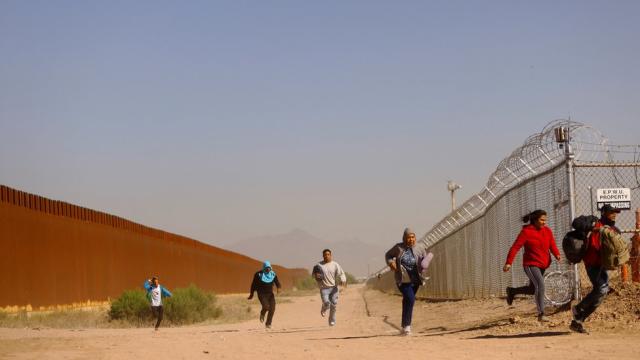
A record-breaking number of over 10,000 migrants were recently apprehended at the US-Mexico border within a 24-hour period, raising concerns about the future as a controversial immigration policy is set to expire. The city of El Paso, Texas, vividly illustrates the realities of what some consider a border “crisis.” Many migrants, uncertain about the impending rule changes, have been forced to sleep in makeshift camps on the city streets in recent days. Thousands of individuals were camped around a single church in the city center earlier this week, prompting Mayor Oscar Leeser to express the need for change and the inability of the community to sustain this situation indefinitely.
Officials believe that the worst may still be ahead. Despite the best efforts of authorities, US President Joe Biden acknowledged earlier this week that the border would remain chaotic for some time. The Title 42 policy, implemented in 2020, allowed US authorities to quickly expel migrants attempting to cross the border from Mexico, including those seeking humanitarian asylum, by citing the Covid-19 pandemic as a justification. However, with the policy set to expire just before midnight on May 11, officials fear that border authorities may be overwhelmed by an influx of migrants. The current record numbers in recent years have already strained resources and left border towns scrambling for solutions.
Mayor Leeser warned that an estimated 10,000 migrants were waiting at the border across from El Paso alone, while Joe Sanchez, the regional director of the Texas Department of Public Safety, likened the situation to a massive stampede at a football game. To address the issue, the Biden administration introduced strict new rules on Wednesday, including a five-year bar on asylum applications for those who cross the border illegally. US officials have also announced changes to encourage migrants to seek legal pathways into the country, along with penalties and swift deportation for those who enter illegally.
In response to the escalating situation at the US-Mexico border, approximately 24,000 law enforcement officers, along with National Guard troops and active-duty military personnel, have been deployed to assist Customs and Border Protection (CBP) along the 2,000-mile (3,218 km) border.
CBP is facing an increasing burden as evidenced in the El Paso sector, where officers have reported 265,000 migrant “encounters” since the current fiscal year began on October 1, representing a 134% rise compared to the previous year. Officers in the area are currently detaining an average of 1,700 migrants daily.
The number of migrants in US custody reached over 27,000 earlier this week, exceeding CBP’s capacity to house them adequately.
In El Paso, authorities are dealing with both “unprocessed” migrants who crossed the border illegally and those who have been released from detention while awaiting a court date with an immigration judge. Some migrants have expressed that they may have to wait years before appearing in court.
To address the situation on city streets, CBP and El Paso police launched an “enforcement” operation, instructing migrants to go to the nearest CBP facility for processing. Those with valid asylum claims were provided court dates, while others were detained for eventual removal. One individual mentioned that their court date was scheduled for 2025 in Miami, Florida.
Migrants in the area shared that some had fled, fearing deportation, while others reluctantly presented themselves to CBP officers hoping to be allowed to stay. One individual, Luis Angel, a 29-year-old Cuban who was paroled into El Paso awaiting his court date, described the situation as chaotic, with some of his friends still being detained.
Picture Courtesy: Google/images are subject to copyright









